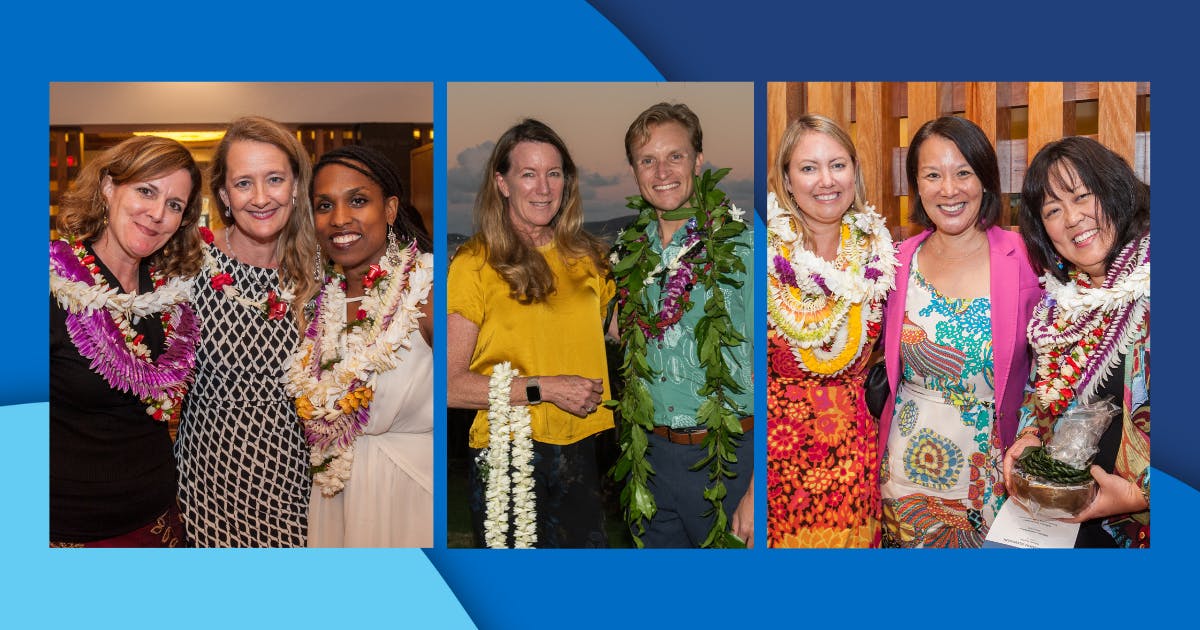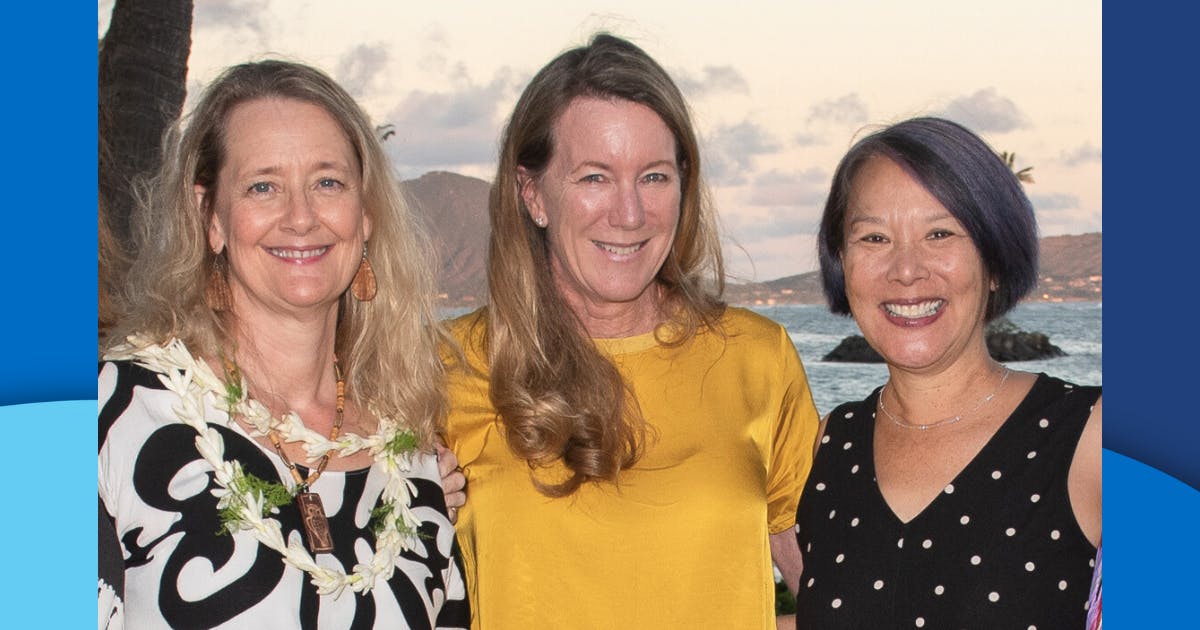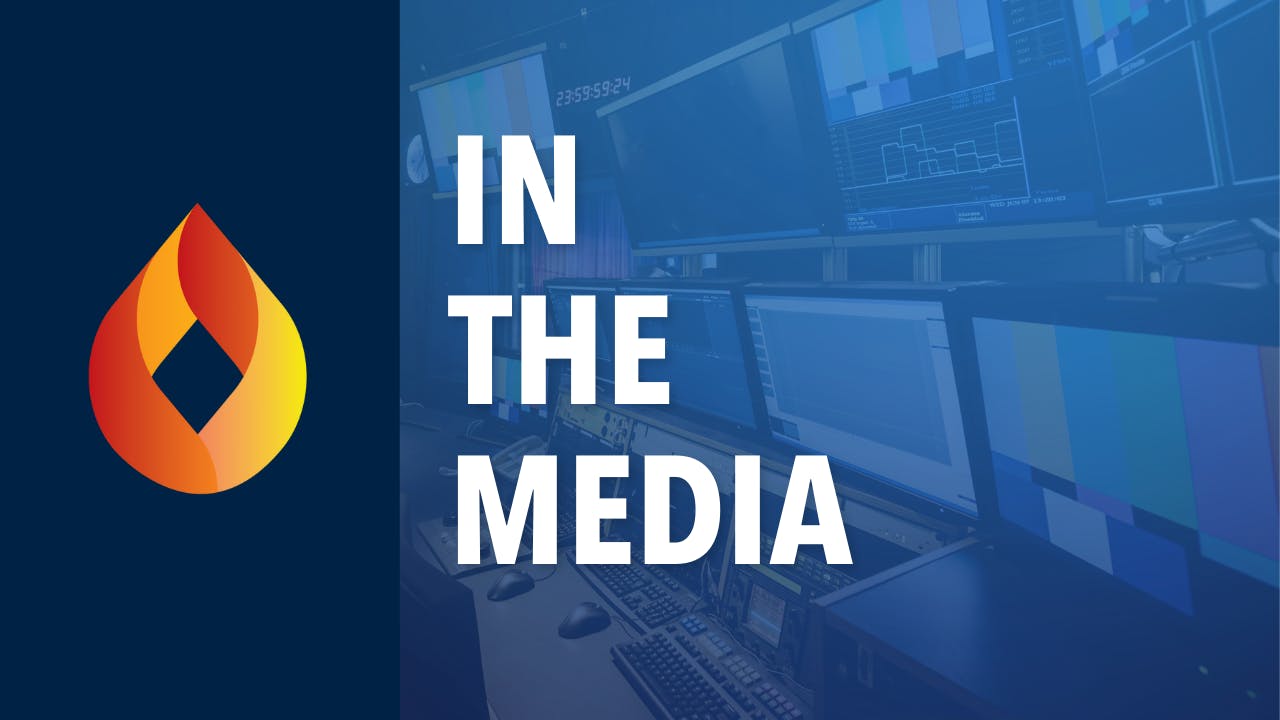
Left photo: Leslie Mullens, Executive Coach Mary Kuentz, Maxine Burkett
Middle photo: Executive Coach Sydney Wiecking, George Yarbrough
Right photo: Margaret Pettyjohn, Executive Coach Wendy Nakamura, Jan Harada
Executive coaching is a key element of the Omidyar Fellows curriculum. Designed to support Fellows and their development as leaders and change agents, executive coaching helps already successful individuals understand their success and recognize and realize their full potential.
Mary Kuentz of Upbuild Leadership Development and Coaching has been an executive coach since 2001. She served as a coach for the program’s inaugural cohort in 2012. Back then, not many people were familiar with executive coaching.
“Coaching was a relatively new experience for people. It was very new in Hawai‘i,” she says. She saw a lot of opportunity in offering coaching as part of this new program to create societal change.
Eight cohorts later, a total of 16 different coaches have worked with the Fellows, and like Mary, many have been partners since the beginning. Wendy Nakamura of Foresight Leadership Development has been coaching for more than 25 years and has coached Fellows in every cohort.
“The impact of coaching has been largely about what I would call the internal work of leadership,” she says. “Many of these folks have advanced very quickly in their careers. They’re trying to learn new things about leadership, about their organization, about what’s expected of them.” Because of this rapid growth, she says that often leaders are left with little time to spend on the internal work.
“Coaching provides them with the opportunity to press the pause button, and what comes out of that is an expanded view of self and the context they’re leading in,” she adds.
Sydney Wiecking, another executive coach since the program’s first cohort with 17 years of coaching experience, agrees.
“Many [Fellows] got a clarity of purpose around ways they can apply their intelligence, their talents, and their desire to serve the community [from coaching],” she says.
WORKING THROUGH CHALLENGES
All three coaches say that one phenomenon that has come up time and time again is imposter syndrome, an unfounded doubt of one’s own skills, talents, and accomplishments.
“[A client is] already in a position of great responsibility and impact. But they still have this sense that, ‘Oh my gosh, I really don’t know what I’m doing. I’m going to get found out one day. I’m just faking it until I make it, and I’m going to trip up and have this huge fall,’” Wendy explains.
“It’s something that very intelligent, very successful people suffer from,” Mary adds.
In addition to taking a toll on a person’s well-being, these feelings of self-doubt can also manifest as a hesitancy to take on more responsibility or bigger leadership roles. The executive coaches work on challenging these deeply seeded beliefs their clients hold to help them make breakthroughs and become stronger leaders.
“It’s about helping them recognize and expand their view of themselves from the outside in, see what others see in them, start believing in that potential, and start building their confidence,” Wendy says.
A coach asks questions like where do you think you already have the capabilities to lead?, what would you need to do to prepare yourself to get to the next level?, and what is your biggest fear if you got there? Then, they offer support and encourage their client to seize opportunities for growth or added responsibility as they come up.
Another tool that helps them work through challenges like imposter syndrome is The Leadership Circle 360 Assessment. Fellows’ colleagues—from peers, to supervisors, to direct reports—are anonymously surveyed to evaluate a Fellow’s leadership and interactions within their organization, and a coach and coachee review and analyze the results together.
Sydney says that in many instances, colleagues’ evaluations of a Fellow are “significantly, noticeably higher” than how a Fellow rates themselves. Coaches help them notice these discrepancies and ask them to think through why that might be and what it could potentially be costing them.
She adds, “Working with this assessment helps people to see where they might be selling themselves short,” or where they could have more effective impact.
“There’s a fine line between shame and humility,” Mary says, “and I think humility is something that’s deeply held in Hawai‘i as a high-value leadership competency.” She says coaching can help people untangle humility from shame so they can "get clear about how to be powerful and humble instead of being stopped by feelings of shame and unworthiness.”
Sydney put it another way: “We don’t own our strengths. We don’t own how we shine.” She says it is a coach’s responsibility to point out where a person is strong, then help them acknowledge and use that strength more effectively while maintaining their modesty.
In addition to building confidence, the evaluations can also reveal leadership gaps.
“When they see [the responses] in black and white, they can see if they struggle with [a particular aspect of leadership] so they can own it and not have to hide it,” says Wendy. “They can work on it, or they can find someone else to support in areas they find challenging.”
Mary says that the coaching process overall has helped people suffer less from imposter syndrome, learn how to “dismantle that part of their belief system about themselves,” and tap into “their true self and who they truly are as leaders.”
FINDING BALANCE
Another common theme that comes up during coaching is seeking balance between their dedication to leadership, service to community, support for their families, and taking care of themselves.
“Self-care and balance for one’s own personal life didn’t exist for many of them [before coaching],” Sydney says. “It was always in service of others.”
Mary adds, “We talk a lot about community held values in Hawai‘i, so the work here is helping people really explore and refine their own values, their family values, as well as the community values.”
She says culture, community, and family can sometimes prescribe values to an individual and dictate what should be priority. Yet when explored, they may find other values of greater importance.
“I use storytelling a lot to help people tell the stories about the moments in their lives where they felt they succeeded or contributed in a way that they felt really proud of,” Mary says. “We go through a process of understanding how those deeply personal stories tell us about what matters most.”
Through these stories, she says many people find clarity about where they could be of greatest service and contribution. When a leader’s values align with their work, they are able to perform more effectively, give more to their community, and feel more fulfilled.
Identifying boundaries can also help with balance. Wendy asks her clients to think about things like what would their life look like in this role, what could it look like for your spouse and kids, what do they want to see in terms of where their priorities are, and how would they make that happen.
The self-care element is also important in avoiding burnout.
�“Some of the work is around how to make your commitment, passion, and all the ways that you serve others sustainable,” Sydney says. “Many times for people in leadership roles—they come last in their life. Part of coaching is having them set commitments or goals for themselves, then holding them accountable.” She adds that the basic experience of setting oneself as a priority can have profound impacts not just on their leadership, but their whole life.

L to R: Executive Coaches Mary Kuentz, Sydney Wiecking, and Wendy Nakamura
COACHING FOR A THRIVING HAWAI‘I
All three coaches recognize that the benefits of executive coaching extend well beyond the person being coached.
Wendy says coaching provides an “expanded view of self, an expanded view of how others see you, and an expanded view of where you might be able to fit into the community and have an impact.”
“It creates space for more of the internal work, which for me is the foundation,” she adds. “You can build skills, but if you don’t have that grounding about who you are as a leader and what your vision for yourself is, then you’re just going to be floating around and not doing your best work for the community.”
Mary echoes that coaching supports people to be in better service to the whole.
“[In Hawai‘i] it is so much about the awareness that we are truly in this together, whether we know each other or not,” she says. “Every conversation I’ve had with Fellows talked about community, family, the people they work with, ancestors—not as problems to be solved, but as partners and stakeholders who are deeply connected to their individual purpose and work. It’s a completely different game when you’re coaching someone who sees themselves as connected to a whole system rather than thinking they’re an individual in it.”
Sydney says that coaching has helped people cultivate healthier, stronger, more engaged personal and professional networks.
“I’ve seen a number of Fellows develop skills and perspectives on building relationships within their teams, their organizations, and their families.” She adds, “I have a number of Fellows who have grown their organizations substantially and committed even more fully to change, to work in the community, and to giving back.”
“What more could you ask for to work with amazing, brilliant, passionate people who are open and willing to be vulnerable, create a close [coaching] relationship, and then go out and do amazing things in the world?” she continues.
Sydney also credits the Omidyar Fellows program in making executive coaching more visible in Hawai‘i. “It’s become a much more common opportunity offered to people in leadership positions, and I think that’s really helpful for Hawai‘i as a whole.”
Mary has also been grateful to serve as a coach. “What I enjoyed is that it was about being able to impact a large amount of people through working with [an individual] beloved Fellow. I loved their vulnerability, transparency, and the deep dedication that they wanted to serve and be their very best. We were truly partners in this process.”
Wendy believes this is only the beginning for these Fellows and other leaders in Hawai‘i. “It’s about potential. There’s so much potential even in people that are already performing at the highest levels. It’s also helped me recognize my own potential to help people see and realize all that is possible. It makes me hopeful for the future.”
Pacific Inno
